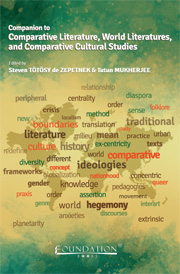Book contents
- Frontmatter
- Contents
- Introduction to the Companion to Comparative Literature, World Literatures, and Comparative Cultural Studies
- PART 1 Theories of Comparative Literature, World Literatures, and Comparative Cultural Studies
- PART 2 Comparative Literature in World Languages
- PART 3 Examples of New Work in Comparative Literature, World Literatures, and Comparative Cultural Studies
- African Literatures and Cultures and the Universal of Motherhood
- World literatures and the Case of Joyce, Rao, and Borges
- Abject Spaces and the Hinterland in Bolaño's Work
- The Motif of Fleeing in Gao's Work
- Arab Fiction and Migration in the Work of Haqqi and Salih
- Sexual Identity and Translation in Prime-Stevenson's Work
- The Notion of Life in the Work of Agamben
- Aesthetics, Opera, and Alterity in Herzog's Work
- An Intermedial Reading of Paley's Sita Sings the Blues
- Painting and Representation in Teaching Balzac
- PART 4 Multilingual Bibliography of Books in Comparative Literature, World Literatures, and Comparative Cultural Studies
- Index
Sexual Identity and Translation in Prime-Stevenson's Work
from PART 3 - Examples of New Work in Comparative Literature, World Literatures, and Comparative Cultural Studies
Published online by Cambridge University Press: 05 April 2014
- Frontmatter
- Contents
- Introduction to the Companion to Comparative Literature, World Literatures, and Comparative Cultural Studies
- PART 1 Theories of Comparative Literature, World Literatures, and Comparative Cultural Studies
- PART 2 Comparative Literature in World Languages
- PART 3 Examples of New Work in Comparative Literature, World Literatures, and Comparative Cultural Studies
- African Literatures and Cultures and the Universal of Motherhood
- World literatures and the Case of Joyce, Rao, and Borges
- Abject Spaces and the Hinterland in Bolaño's Work
- The Motif of Fleeing in Gao's Work
- Arab Fiction and Migration in the Work of Haqqi and Salih
- Sexual Identity and Translation in Prime-Stevenson's Work
- The Notion of Life in the Work of Agamben
- Aesthetics, Opera, and Alterity in Herzog's Work
- An Intermedial Reading of Paley's Sita Sings the Blues
- Painting and Representation in Teaching Balzac
- PART 4 Multilingual Bibliography of Books in Comparative Literature, World Literatures, and Comparative Cultural Studies
- Index
Summary
Abstract: In her article “Sexual Identity and Translation in Prime-Stevenson's Work” Margaret S. Breen examines the role of translation in lesbian, gay, bisexual, and transgender studies. Breen's focus is Edward Prime-Stevenson, who, under the penname Xavier Mayne, wrote two works: a short novel, Imre: A Memorandum (1906), and a general history of homosexuality, The Intersexes: A History of Similisexualism as a Problem of Social Life (1908). Breen argues that Prime-Stevenson's texts are relevant to late nineteenth- and early twentieth-century discussions of (homo)sexuality because they point to the importance of translation in writings concerning sexual and gender identities and behavior, specifically in lesbian, gay, bisexual, and transgender literature from the late nineteenth century forward.
Under the penname Xavier Mayne, Edward Prime-Stevenson wrote two works which are fascinating to consider in light of late nineteenth- and early twentieth-century discussions of homosexuality: a short novel, Imre: A Memorandum (1906), and a general history of homosexuality, The Intersexes: A History of Similisexualism as a Problem of Social Life (1908). These texts are key to understanding the importance of translation as both a linguistic and metaphoric act in fin-de-siècle writings concerning sexual and gender identities and behaviors; more broadly, these texts attest to the value of comparative cultural and literary approaches for the study of lesbian, gay, bisexual, and transgender (LGBT) literature from the late nineteenth century forward. Simply put, translation facilitates the making of meaning within and across languages.
- Type
- Chapter
- Information
- Companion to Comparative Literature, World Literatures, and Comparative Cultural Studies , pp. 434 - 446Publisher: Foundation BooksPrint publication year: 2014

